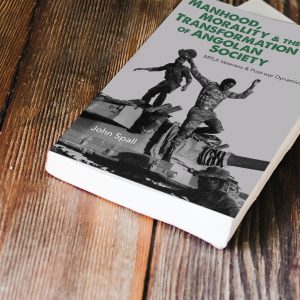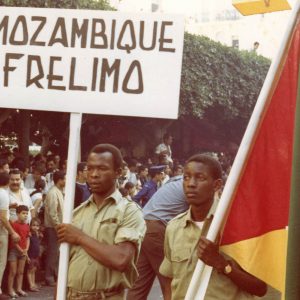Book Review | Cuddling men and tailoring scissors
Nigerian author TJ Benson centres the experiences of African millennials in the ‘bizarre paradise’ of his deeply subversive and playful novel, The Madhouse.
Author:
15 April 2021

The Madhouse is a work of dazzling complexity, a pan-African tribute to art and artists alike that explores the strange lives of a family of four. Setting the novel against the political uncertainty of Nigeria in the 1980s and 1990s, author TJ Benson takes his readers on a hallucinatory journey spanning decades and time zones with the titular character – an old asylum-cum-family home – as a portal into the secrets, dreams and yearnings of brothers André and Macmillan, and their parents Sweet Mother and Sharriff.
The Madhouse calls to mind the energy of Arundhati Roy’s The God of Small Things and the expansiveness of Namwali Serpell’s The Old Drift. From writing about how “broken glass jutted out of the top [of the walls surrounding the house] in places to keep robbers away” to the experience of growing up in transitional political states and fledgling democracies, Benson portrays the complex childhoods of today’s thirtysomething Africans in both ordinary and surreal ways.
In voice notes and direct messages on Instagram, Benson speaks about his highly anticipated debut.
“I was writing to young African millennials,” says the author, who explores the way that individuals and communities coped with political instability.
“I was interested in the surrealist mythology and superstitions that arose from living under oppressive African regimes in the 1980s and 1990s.” These mythologies may differ from country to country but their purpose – a means to interpret and withstand the violence of daily life – will connect with readers across the continent.
Related article:
Benson carves out cultural touchstones that are markers of a life lived in Africa. A February so hot it is ruinous. The strange remnants of British colonisation. Winds. A reverence for rainfall. Many versions of English. And then there is electricity: its absence, its unreliability and how it is weaponised by politicians. In the novel, all of this takes place in towns outside the major city centres.
“I grew up in the middle belt and I felt life in the middle belt was worthy of writing about, too,” says Benson. “I was careful with the location and the tribes of my characters because most of what the world knows from Nigerian literature is southeastern Nigeria and Lagos. I worked hard to make sure Lagos didn’t appear in the book and that popular names from the major tribes of Nigeria, like Yoruba and Igbo, didn’t appear.”
Nothing is impossible in The Madhouse. A chaotic plot sees star-crossed lovers caught between Islam and Christianity, hints of cannibalism, hypnotised chickens, a school that syncs itself to one girl’s menstrual cycle and supernatural sexual experiences as brothers fall into each other’s dreams and rescue each other from death. “From reading what is written by other people on the continent, in a sense there’s the innovative feeling of a puzzle. If I write my own mythology here, maybe someone else will be inspired to talk about their mythology. We’re creating a historical archive of mythologies in Africa,” says Benson.
‘The luxury of disorganisation’
The madhouse is a beautiful otherworld, a place where men fight to rear their children and boy babies suckle on their father’s nipples. “I was invested in intimacy between the brothers and then between father and sons because I didn’t see it enough in what I watch and read,” says Benson. Men fall asleep in one another’s laps. They hold each other and cuddle, while boys possess “supernatural” beauty, in a sensitive inversion of gendered stereotypes.
On the flipside, there are female paedophiles, knife-wielding foster daughters, abusive mothers and a wife who murders her husband with tailoring scissors. Though their acts are dastardly, the women in Benson’s book have as much agency as men. They are not all sweet docility, or rendered docile. They make decisions, act on their impulses and do things in a way that is generally thought of as masculine.
Related article:
As he deconstructs tropes about masculinity and femininity, Benson subverts clichés about African people and the continent. The family may live in the old asylum in Sabon Gari, but they revel in the austere decadence of their home. There is no electricity but as one character points out, they are too rich to store leftovers in a refrigerator, they simply buy more food the following day. “Cooking timetables are for homes in countries that have light.”
Was this luxuriating in chaos a rejection of clichés about poverty? “Precisely,” says Benson. “I wanted to inhabit and subvert those tropes. No electricity may mean more time for mother to paint; no proper jobs means more time for parents to raise and play with their children.” The characters build a world where they are “untouched by the state of affairs in the country”.
In one example of the mythological ways in which he portrays this, Benson’s characters grow narcotic vegetables that put the family to sleep for hours. In the spirit of his metaphysical urban legend-making, this is “a way for the family to check out of the times, so that poverty and the menace from the military won’t enter the consciousness of their boys”.
‘It tastes like America’
In some ways, The Madhouse reads as a way of legitimising African millennial experiences. It is an antidote to our knee-jerk urge to translate experiences and find the African “equivalent” to American rites of passage. “Music, television and books were American growing up,” says Benson. “Before I turned 10, I thought it was ridiculous to have an African like me in a book … I decided to centre the experience of being a young Nigerian growing up in the 1990s, with all our urban legends and particular teenage angst.”
Benson, who was a runner-up for the Short Story Day Africa Prize in 2016, wants his book to contribute to a growing body of work by African millennial writers. “Short story prizes and publications have created a new locality for African writers to thrive. We read each other and know about each other’s lives, travels and cultures, all from social media.” The immediacy of social media has amplified the sense of community that has emerged from these works. Authors are attending digital book launches and getting to know one another, joining the same online groups and sharing links to pre-orders, reviews and press.
Related article:
Social media has given African writers – who are often passport-starved and visa-barred from entering one another’s countries, never mind the prohibitive cost of travel – a digital meeting place. As a result, writers on the continent and in the diaspora have a neighbourly sense of one another’s lives, and can enter and exit one another’s conversations, arguments and work in ways that were impossible to imagine previously.
‘Something out of our collective fantasy’
But imagination and impossibility are the two exact things Benson writes about in his book, where merely surviving Nigeria – or one’s parents – is in itself a supernatural act.
It pays homage to his reality and the kinship that emerges from joining the ranks of writers such as “Sibongile Fisher, Troy Onyango, Pemi Aguda, Joe Aito, Gloria Mwaniga, Nnamdi Ehirim, Ope Adedeji and Otosirieze Obi-Young” who do the same, which energises Benson.
“I didn’t know it at the time, but I see how writing this book was my own piece to the puzzle, a contemporary puzzle of Africa other millennial writers were already filling with their short stories,” he says.
About The Madhouse, the issues to which it speaks and how its characters will infuriate, shock and delight you, Benson says it best in his author note: “I had to discard whatever presumptions of what was real to my imagined critic, because I am Nigerian and I was born into impossible times.”



